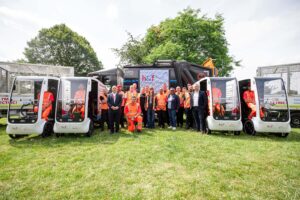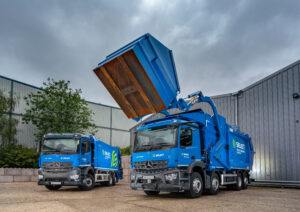The UK is expected to have 10,000 hydrogen HGVs on the road by 2035, according to Hannah Bryson-Jones from H2Accelerate. However, much still needs to be done to ensure the technology and skills are in place to facilitate the transition.
Hannah said hydrogen trucking is becoming more important thanks to a mix of policies that will make the cost of operating diesel trucks more expensive in the UK and EU and mandate the phasing out of non-zero-emission HGVs. Hannah is the founder of Delta H and the spokesperson for H2Accelerate, a collaboration between some of Europe’s biggest energy infrastructure providers and vehicle OEMs to accelerate hydrogen trucking.
‘There is a time pressure to move away from diesel, but to reach zero emissions, we have two options: battery electric and hydrogen. Both solutions are needed, and H2 is particularly needed in the heavy-duty sector from an energy system and fleet operator perspective.’
In terms of energy systems, Hannah explained that as we move to a system increasingly reliant on solar and wind power, there will be times when ‘the sun isn’t shining and the wind isn’t blowing’. That’s when hydrogen will be needed. It can be used as a long-term energy storage vector and enables international energy transfer in various forms.
‘From the fleet operator perspective, it offers faster fuelling and longer range. Hydrogen vehicles also have a similar operational profile to diesel, and the challenges of grid constraints can require huge investment. While H2 has its challenges, we can transport it from places with lots of renewable energy to places without.’
H2Accelerate hopes to overcome the ‘chicken and egg’ conundrum of hydrogen supply and demand by bringing together both sides of the equation. The organisation has three key activities: providing the evidence base on the benefits and challenges of hydrogen trucking, communicating with policymakers, end users, and the industry, and deploying projects and acquiring funding.
The aim is to develop a pan-European refuelling network to enable the full commercialisation of hydrogen trucking from 2035 onwards. ‘We need to do it in a staged process, but we need to do it quickly.’
Hannah said phase one of the project has secured funding to deploy 150 fuel-cell trucks in nine countries and 29 refuelling stations in six countries. ‘This gives us a good base for expansion and is the largest hydrogen truck project in Europe,’ said Hannah. ‘It also gives us an idea of what we need to do to scale it up. And that scale-up curve needs to be exponential to meet the targets.’
Hannah said that truck OEMs and hydrogen infrastructure players must invest in scaling up truck production and hydrogen refuelling infrastructure if hydrogen vehicles are to reach an acceptable cost of ownership for logistics operators by 2035. ‘But without policy support, uptake of fuel cell vehicles will be much slower, making it difficult for companies to make large-scale investments.’
She outlined measures that could help achieve cost parity, such as a CAPEX subsidy, differential road tolls, and a carbon tax. ‘Over time, the cost of operating H2 trucks will come down and require a smaller subsidy, and as we scale up further, we won’t need subsidies at all.’
Hannah noted that the UK has ambitious goals to support H2 trucking. In 2023, H2Accelerate published a white paper on the UK’s policy landscape that proposed 11 stations every 200km, supported by the right level of demand – around 20 vehicles per station. ‘But government intervention is required. This would need a subsidy of around £80 million.’




